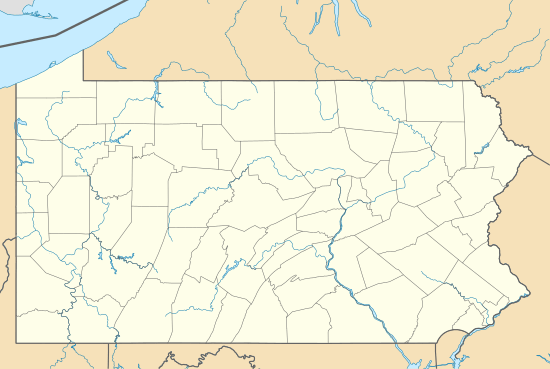Dr. Joseph Leidy House
|
Dr. Joseph Leidy House | |
|
(2013) | |
   | |
| Location | 1319 Locust St., Philadelphia, Pennsylvania |
|---|---|
| Coordinates | 39°56′52″N 75°9′50″W / 39.94778°N 75.16389°WCoordinates: 39°56′52″N 75°9′50″W / 39.94778°N 75.16389°W |
| Built | 1893 |
| Architect |
Wilson Eyre, Jr. G. Edwin Brumbaugh |
| Architectural style | Colonial Revival |
| NRHP Reference # | 80003613[1] |
| Added to NRHP | December 04, 1980 |
The Dr. Joseph Leidy House is a historic residence located at 1319 Locust Street between S. 13th and S. Juniper Streets in the Washington Square West neighborhood of Philadelphia, Pennsylvania. It was built in 1893-94 and was designed in the Georgian style[2] by noted architect Wilson Eyre to be the home of Joseph Leidy, Jr., the nephew of Joseph Leidy (1823–1891), a noted American paleontologist with whom he is often confused. The house is next door to the Clarence B. Moore House, which was designed by Eyre in 1890. From 1925 to 1979, the Leidy House served as the clubhouse of the now-defunct Poor Richard Club, whose members worked in advertising,[3] and, with the Moore House next door, was part of the Charles Morris Price School of Advertising and Journalism.[4] Currently, it is the headquarters of District 1199C, the National Union of Hospital and Health Care Employees.[4]
The house was added to the National Register of Historic Places in 1980.[1]
See also
 Philadelphia portal
Philadelphia portal- National Register of Historic Places listings in Center City, Philadelphia
References
- 1 2 National Park Service (2009-03-13). "National Register Information System". National Register of Historic Places. National Park Service.
- ↑ Gallery, John Andrew, ed. (2004), Philadelphia Architecture: A Guide to the City (2nd ed.), Philadelphia: Foundation for Architecture, ISBN 0962290815, p.79
- ↑ "National Historic Landmarks & National Register of Historic Places in Pennsylvania" (Searchable database). CRGIS: Cultural Resources Geographic Information System. Note: This includes George E. Thomas and David Fair (July 1980). "National Register of Historic Places Inventory Nomination Form: Dr. Joseph Leidy House" (PDF). Retrieved 2012-06-16.
- 1 2 Historical marker on building
External links
 Media related to Dr. Joseph Leidy House at Wikimedia Commons
Media related to Dr. Joseph Leidy House at Wikimedia Commons- Listing and photograph at the Historic American Buildings Survey
- Listing at Philadelphia Architects and Buildings


